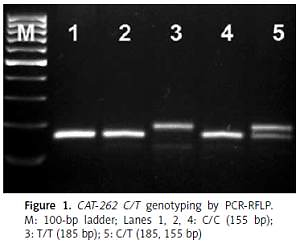Current issue
Archive
Manuscripts accepted
About the Journal
Editorial office
Editorial board
Section Editors
Abstracting and indexing
Subscription
Contact
Ethical standards and procedures
Most read articles
Instructions for authors
Article Processing Charge (APC)
Regulations of paying article processing charge (APC)
HEMATOLOGY / CLINICAL RESEARCH
An investigation of the relation between catalase
C262T gene polymorphism and catalase enzyme
activity in leukemia patients
1
Department of Medical Genetics, Faculty of Medicine, Mersin University, Mersin, Turkey
2
Department of Medical Biology, Faculty of Medicine, Mersin University, Mersin, Turkey
3
Department of Hematology, Faculty of Medicine, Mersin University, Mersin, Turkey
4
Department of Biochemistry, Faculty of Pharmacy, Mersin University, Mersin, Turkey
5
Department of Pharmaceutical Technology, Faculty of Pharmacy, Yuzuncu Yil University, Van, Turkey
6
Vocational School of Health Service, Mersin University, Mersin, Turkey
Submission date: 2018-01-15
Final revision date: 2018-05-30
Acceptance date: 2018-06-23
Online publication date: 2019-11-12
Publication date: 2021-07-16
Arch Med Sci 2021;17(4):928-933
KEYWORDS
TOPICS
ABSTRACT
Introduction:
Catalase (CAT), an antioxidant enzyme, catalyzes conversion of hydrogen peroxide to water and molecular oxygen, protecting cells against oxidative stress. The aim of this study was to investigate the possible association between CAT C262T polymorphism in the promoter region of the CAT gene and leukemia risk and to determine the relationship between CAT genotypes and CAT enzyme activities.
Material and methods:
Genotypes of 102 cases and 112 healthy controls’ genotypes were determined by polymerase chain reaction-restriction fragment length polymorphism methods. Catalase activity was measured with the method of Aebi.
Results:
The frequencies of the T allele among the cases and controls were 28.4% and 25.9%, respectively (p = 0.75). The frequencies of CC, CT, and TT among cases were 57.8%, 27.4%, and 14.7%, respectively, while in controls, the frequencies of CC, CT, and TT were 54.4%, 39.3%, and 6.3%, respectively, which were not significantly different. Although CAT enzyme activity was lower in leukemia patients with TT genotypes than in controls, this did not reach statistical significance (p = 0.37).
Conclusions:
This is the first report showing that CAT C262T polymorphism is not a genetic predisposing factor for the risk of leukemia in the Turkish population. However, additional research is needed to confirm these findings.
Catalase (CAT), an antioxidant enzyme, catalyzes conversion of hydrogen peroxide to water and molecular oxygen, protecting cells against oxidative stress. The aim of this study was to investigate the possible association between CAT C262T polymorphism in the promoter region of the CAT gene and leukemia risk and to determine the relationship between CAT genotypes and CAT enzyme activities.
Material and methods:
Genotypes of 102 cases and 112 healthy controls’ genotypes were determined by polymerase chain reaction-restriction fragment length polymorphism methods. Catalase activity was measured with the method of Aebi.
Results:
The frequencies of the T allele among the cases and controls were 28.4% and 25.9%, respectively (p = 0.75). The frequencies of CC, CT, and TT among cases were 57.8%, 27.4%, and 14.7%, respectively, while in controls, the frequencies of CC, CT, and TT were 54.4%, 39.3%, and 6.3%, respectively, which were not significantly different. Although CAT enzyme activity was lower in leukemia patients with TT genotypes than in controls, this did not reach statistical significance (p = 0.37).
Conclusions:
This is the first report showing that CAT C262T polymorphism is not a genetic predisposing factor for the risk of leukemia in the Turkish population. However, additional research is needed to confirm these findings.
Share
RELATED ARTICLE
We process personal data collected when visiting the website. The function of obtaining information about users and their behavior is carried out by voluntarily entered information in forms and saving cookies in end devices. Data, including cookies, are used to provide services, improve the user experience and to analyze the traffic in accordance with the Privacy policy. Data are also collected and processed by Google Analytics tool (more).
You can change cookies settings in your browser. Restricted use of cookies in the browser configuration may affect some functionalities of the website.
You can change cookies settings in your browser. Restricted use of cookies in the browser configuration may affect some functionalities of the website.



